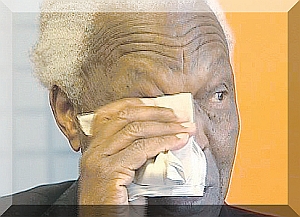Is Kenya's Truth Commission Ready to Face the Truth?

 |
| Amb. B. Kiplagat: Embattled |
It is apparent that for many Kenyans, especially the victims of gross human injustices under former presidents Kenyatta and Moi regimes, the Truth commission leadership as currently constituted is a hard slap in the face for various reasons.
Our Concerns
Firstly, for the victims and families of victims of gross atrocities meted out by past governments, it is to add insult to injury to appoint to the Truth Commission persons against whom Kenyans hold real or perceived suspicions of being minions of the oppressors past. As eloquently verbalised at the Truth commission’s grassroots acquaintance at Mombasa, to a majority of Kenyans the TJRC chair, Ambassador Bethwel Kiplagat is a reminder of persons or embodiment of powerful cartels that presided over past injustices and therefore lacks public acceptance and moral authority to preside over the very process touted as a means of resolving that difficult past. The Truth Commission is being led by luminaries who served in the oppressive regimes that commissioned human injustices that the Truth Commission is mandated to look into. In addition, the Truth Commission’s leadership has individuals that enjoy close relationship with the current executive and it is therefore prejudicial for citizens to present their views on present injustices to persons they see as wolves in sheep’s clothing.
Secondly, the limited legal mandate of the Truth Commission to look at injustices only dating back to December, 1964 effectively outlaws a section of Kenyans that experienced injustices in the period between the declaration of the state of emergency in 1952 and December, 1964. There are Kenyans from this period who are still alive and aggrieved. To deny them a hearing at the Truth Commission is to blatantly deny them token justice. For instance, why should we lock out the survivors of British police brutality during the 1952 state of emergency? It is difficult to understand exactly what allegiance it is we continue to hold to her Majesty, many years after “independence.” Furthermore, by an Indemnity Act of 1967 citizens in North Eastern Kenya are already locked out of the Truth Commission process.
Thirdly, Truth Commissions are put in place for purposes of breaking from a darkness of the past. In progressive countries, Truth Commissions only happens when a new chapter is being opened in the country’s history either by a radical change in leadership or by a major overhaul of the country’s constitution. In Kenya’s case, neither of these two characteristics is currently manifest. Presently, we are in the struggle for a new constitution dispensation and still stuck with a largely recycled leadership. To have in place a Truth Commission backed by a constitution that has been instrumental suppression and oppression acts is a defeatist because it signals that we are still in the dark ages and are treating a flicker of light as though we are already out of the dark past.
Our rights, our demands:
One, Kenyans therefore demand that the Truth Commission should be disbanded and reconstituted taking into consideration all the above weighty concerns. The Truth Commission is a public court in whose process Kenyans should have confidence if it is to successfully bring forth the truth and be the avenue of justice and reconciliation. It is therefore imperative that one man at least, or a few individuals at most, in its leadership should not be a stumbling block to achieving this mandate. Unless of course, there is, as there historically has been, underlying political and self-serving reasons why it must be these specific individual(s) that must be in charge. In which case, Kenyans reject the process in total as a sham and will not hesitate to expose it as being so.
Two, Ambassador Kiplagat should be advised that his purported successes in peace negotiations in countries such as Somalia, Sudan, Rwanda and Uganda do not answer our questions on his public acceptance. He did not serve in the oppressive regimes of the mentioned countries. To Kenyans, if Ambassador Kiplagat has our best interests at heart, he should exercise wisdom by resigning and permitting Kenyans to give themselves in his stead a Kenyan who will command a sense of confidence in the truth, justice and reconciliation process.
Three, man was not made for the law but the law for man. Therefore, any law that warns of scuttling or interfering with the Truth Commission must be immediately repealed. We insist that there must be absolutely no Kenyan left out of the truth, justice and reconciliation exercise.
Four, to the political class, Kenyans wish to reiterate that the walkout by a section of Kenyans in Mombasa was not an isolated action but a poetic message to Ambassador Bethwel Kiplagat led Truth team, President Mwai Kibaki the appointing authority and Parliamentarians as the endorsing body, that in the days ahead, the Truth Commission’s public activities will be riddled with instances of Kenyans employing all methods of civic engagement at their disposal to frustrate it unless and until Ambassador Bethwel Kiplagat and other questionable luminaries heading the process make their exit.
Fifth, Kenyans should heighten the exercise of their inherent sovereignty and exploit any appropriate techniques to frustrate Truth Commission until the Chair grinds to a halt and quits or the appointing authority tires and fires him. We, the people, must not relent until we give ourselves a leadership and legal framework within which to audit and deal with our past.
By George Nyongesa,
Bunge La Mwananchi.
Bunge la Mwananchi http://www.bungelamwananchi.com/ is a platform for grassroots Kenyans to engage in democratic expression on governance, political accountability and social justice issues.
